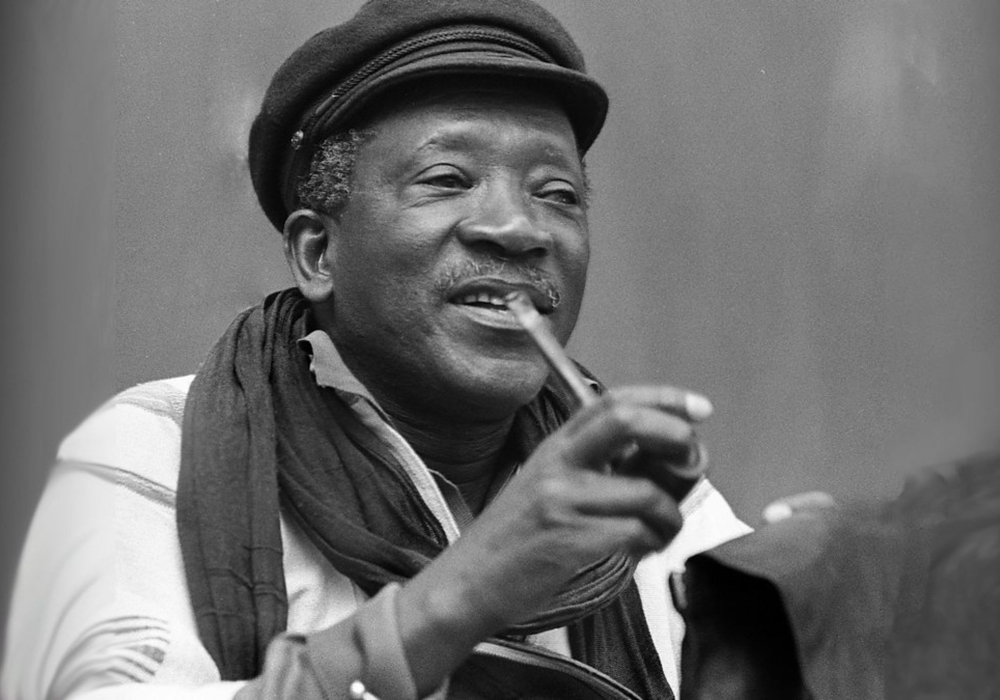Perfectly fitting for Black History Month, TIFF Bell Lightbox will present starting tomorrow, Saturday, February 5th, 2011, until Sunday, February 13th, Ousmane Sembène: In the Face of History -- a cinematic retrospective featuring the late Senegalese filmmaker Ousmane Sembène (1923-2007). Often referred to as “the father of African cinema,” Sembène was a true pioneer of African cinema.
Both a writer and filmmaker, Ousmane Sembène was acutely aware that cinema was a much more potent tool to foster political change and mass awareness in Africa than the written word. He was not content to simply have a following among the tiny cultural elite who were adept at his books. A man of the people himself from a humble background, he worked as a factory labourer and docker in post-war France following his service in the French colonial army in World War II. Active in the trade union movement, he became sympathetic to the discourse of Marxists while never adhering himself to any political party
After returning to Senegal in 1960, he felt more than ever that becoming a filmmaker would be the most effective way to affect real change—particularly given the high level of illiteracy in his homeland. Several of his films were, in fact, film adaptations of his earlier novels and short stories. At the age of 40, he returned to Europe to learn the art of cinematography at the Gorki Studios in Moscow.
In 1966, he produced his first feature film, La Noire de … (Black Girl), which was the first feature film ever released by a sub-Saharan African director.
AfroToronto.com recently had the opportunity to discuss the work and legacy of Ousmane Sembène with Carleton University Assistant Professor of Film Studies Aboubakar Sanogo. Professor Sanogo will be present at Totonto’s TIFF Lightbox for a free lecture on Saturday, February 5th, at 5 pm.
Professor Sanogo pointed out to us that La Noire de ... (Black Girl) is a visionary film which came 40 years before its time.
The film tells the story of a hopeful, young and beautiful Senegalese servant, Diouana (Mbissine Thérèse Diop), who arrives in the picturesque French Riviera town of Antibes to work for a French colonial couple. Back in Senegal, she had been hired to take care of the couple’s children. But when she arrived in France, her hopes of finding a better life in Europe were dashed. She soon realized that she was not being given the freedom to go outside and was increasingly treated as nothing more than a servant.
Professor Aboubakar Sanogo believes that the film is very relevant to modern Africa because many of the continent’s youth dream of leaving Africa to live what they perceive would be a better life in Europe. “While Sembène portrayed what was at the time individual journeys of immigration, today we are faced with a massive exodus out of Africa,” Sanogo says. “There is a kind dynamic focusing on both current events and an anticipated future in much of Sembène’s work,” he adds.
Another Ousmane Sembène film which is very relevant to the current situation of Africans and their relationship with Europe is 1987’s Camp de Thiaroye.
Camp de Thiaroye is a historical fiction based on the real events surrounding the Thiaroye transit camp massacre in 1944. The film tells the story of West African colonial troops who are stationed in a transition and repatriation camp after fighting France’s war in the trenches of World War II Europe. Sembène brings to light the heroic exploits of these unsung heroes of the Great War and how they were discarded, lied to and mistreated after their useful service in the war effort.
Sembène was definitely a political filmmaker. He did not shy away from admitting to that. According to Ousmane Sembène, cinema has a political role in society. The Socratic city could not in good conscience be left entirely in the hands of the rulers. Cinema has to play a role in maintaining democracy by offering a critical voice that is accessible to the masses.
“The film was censored in France for a very long time,” Aboubakar Sanogo tells AfroToronto.com. “It came out in France maybe 8 or 10 years after its official release. ... Even when he was making the film, French military helicopters were circling above the set. … The French have invested a lot of money in African cinema; even in some of Sembène’s films. But for Camp de Thiaroye, they did not invest a penny. It’s not devoid of meaning. We know why. Because, as you know, the history is problematic. The truth is that France could never have come out of World War II as they did without Africa. … The French have denied this fact for a long time.”
Professor Sanogo goes on to point out that having this discussion through Sembène’s film is important because it’s at the heart of today’s immigration debate in France. Given Africa's contribution to French society, African youth have a difficult time coming to terms with their exclusion from French society in terms of jobs and social mobility.
Films like Camp de Thiaroye and Rachid Bouchareb's more recent Indigènes, which tell a similar story of North African French colonial forces in World War II, serve as important agents of social change.
Speaking of this vision of the role of film in society as expressed by Ousmane Sembène, Professor Aboubakar Sanogo says:
“This idea is present in the minds of all African filmmakers. Ousmane Sembène is a great ghost [laughs] who will haunt African cinema for generations in one way or another. Whether they are Marxists or not, African filmmakers somehow now have this nagging worry and anxiety. They ask themselves how they can, through their films, help to shape Africa. This is a direct consequence of Ousmane Sembène.”
Promotion note: If you buy a ticket to any Ousmane Sembene screening, you will receive a free ticket to the in-person event with Aboubakar Sanogo on February 5th.





